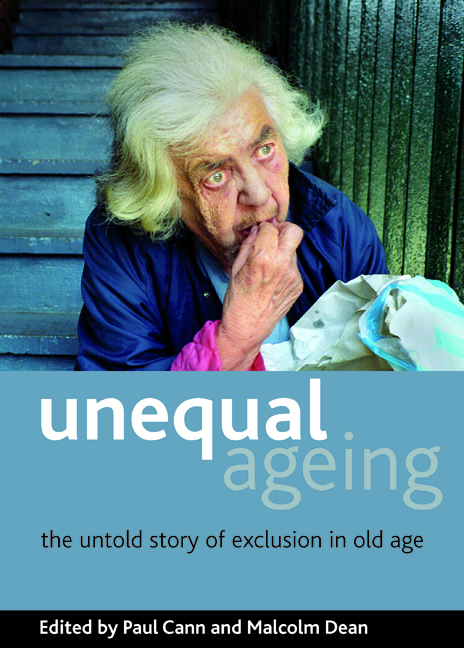Book contents
- Frontmatter
- Contents
- List of tables and figures
- Notes on contributors
- Acknowledgements
- one How social age trumped social class?
- two Too tight to mention: unequal income in older age
- three three The uneven dividend: health and well-being in later life
- four No place like home? Housing inequality in later life
- five What does it mean to be old?
- six A life worth living? Quality of life in older age
- seven Why is ageing so unequal?
- eight Rewriting the story
- Index
five - What does it mean to be old?
Published online by Cambridge University Press: 16 July 2022
- Frontmatter
- Contents
- List of tables and figures
- Notes on contributors
- Acknowledgements
- one How social age trumped social class?
- two Too tight to mention: unequal income in older age
- three three The uneven dividend: health and well-being in later life
- four No place like home? Housing inequality in later life
- five What does it mean to be old?
- six A life worth living? Quality of life in older age
- seven Why is ageing so unequal?
- eight Rewriting the story
- Index
Summary
• Seventy-five per cent of older people surveyed think the views of their age group are ignored by the media.
• The story of the abuse of the child Victoria Climbié attracted over 300 mentions in the press; the equally horrific experiences of 78-year-old Margaret Panting received just five.
• Twenty-seven per cent of people surveyed thought that people aged over 70 are viewed with pity.
Ageism … in our bloodstream
We live in an inherently ageist society – ageism is well recognised and it is the most commonly experienced form of discrimination. Whether it is the lack of provision of automatic call and recall for breast cancer screening for women over 73 (the implication is that they are no longer part of the working and therefore ‘useful’ population, so their lives do not matter as much as those of younger women), or the assumption that it is perfectly acceptable to play blaring rock music on the radio to a room full of frail older people in a care home because the staff like it, without consideration for what the residents like, discrimination against older people, in almost all aspects of their lives, is profound and disabling. And it devalues those who display that level of ignorance and unfair discrimination as much as it impacts with negative effect on the older people who experience it.
‘Successful’ ageing …
Age discrimination is widespread, but it does not necessarily affect all older people. There are those older people – usually the very old – who become in some way national treasures. Diana Athill, enjoying a renaissance in popularity as a writer in her 90s with her book Somewhere towards the end, is a case in point, winning the biography category of the Costa book awards in January 2009. Frances Partridge, the last of the Bloomsbury Group, who died at 103 in 2004, really achieved fame in her later years with her biography of Julia Strachey and her five volumes of diaries, and was another ‘national treasure’. But these were and are exceptional women, though by no means alone.
Those who live into a healthy and sufficiently wealthy older age, with activities for the mind and the capacity to feel needed, are not necessarily discriminated against as much as those whose bodies play them up more or whose minds begin to go.
- Type
- Chapter
- Information
- Unequal AgeingThe Untold Story of Exclusion in Old Age, pp. 101 - 122Publisher: Bristol University PressPrint publication year: 2009
- 3
- Cited by



